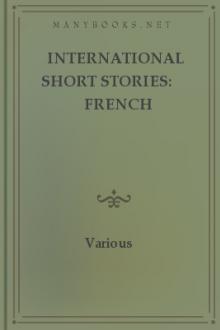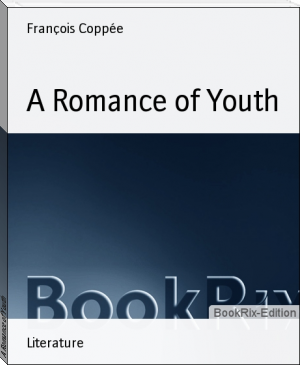International Short Stories: French by - (young adult books to read .TXT) 📖

- Author: -
- Performer: -
Book online «International Short Stories: French by - (young adult books to read .TXT) 📖». Author -
All the judges admired Zadig for his acute and profound discernment. The news of this speech was carried even to the king and queen. Nothing was talked of but Zadig in the antechambers, the chambers, and the cabinet; and though many of the magi were of opinion that he ought to be burned as a sorcerer, the king ordered his officers to restore him the four hundred ounces of gold which he had been obliged to pay. The register, the attorneys, and bailiffs went to his house with great formality, to carry him back his four hundred ounces. They only retained three hundred and ninety-eight of them to defray the expenses of justice; and their servants demanded their fees.
Zadig saw how extremely dangerous it sometimes is to appear too knowing, and therefore resolved that on the next occasion of the like nature he would not tell what he had seen.
Such an opportunity soon offered. A prisoner of state made his escape, and passed under the window of Zadig’s house. Zadig was examined and made no answer. But it was proved that he had looked at the prisoner from this window. For this crime he was condemned to pay five hundred ounces of gold; and, according to the polite custom of Babylon, he thanked his judges for their indulgence.
“Great God!” said he to himself, “what a misfortune it is to walk in a wood through which the queen’s spaniel or the king’s horse has passed! how dangerous to look out at a window! and how difficult to be happy in this life!”
THE ENVIOUS MANZadig resolved to comfort himself by philosophy and friendship for the evils he had suffered from fortune. He had in the suburbs of Babylon a house elegantly furnished, in which he assembled all the arts and all the pleasures worthy the pursuit of a gentleman. In the morning his library was open to the learned. In the evening his table was surrounded by good company. But he soon found what very dangerous guests these men of letters are. A warm dispute arose on one of Zoroaster’s laws, which forbids the eating of a griffin. “Why,” said some of them, “prohibit the eating of a griffin, if there is no such an animal in nature?” “There must necessarily be such an animal,” said the others, “since Zoroaster forbids us to eat it.” Zadig would fain have reconciled them by saying, “If there are no griffins, we cannot possibly eat them; and thus either way we shall obey Zoroaster.”
A learned man who had composed thirteen volumes on the properties of the griffin, and was besides the chief theurgite, hastened away to accuse Zadig before one of the principal magi, named Yebor, the greatest blockhead and therefore the greatest fanatic among the Chaldeans. This man would have impaled Zadig to do honors to the sun, and would then have recited the breviary of Zoroaster with greater satisfaction. The friend Cador (a friend is better than a hundred priests) went to Yebor, and said to him, “Long live the sun and the griffins; beware of punishing Zadig; he is a saint; he has griffins in his inner court and does not eat them; and his accuser is an heretic, who dares to maintain that rabbits have cloven feet and are not unclean.”
“Well,” said Yebor, shaking his bald pate, “we must impale Zadig for having thought contemptuously of griffins, and the other for having spoken disrespectfully of rabbits.” Cador hushed up the affair by means of a maid of honor with whom he had a love affair, and who had great interest in the College of the Magi. Nobody was impaled.
This levity occasioned a great murmuring among some of the doctors, who from thence predicted the fall of Babylon. “Upon what does happiness depend?” said Zadig. “I am persecuted by everything in the world, even on account of beings that have no existence.” He cursed those men of learning, and resolved for the future to live with none but good company.
He assembled at his house the most worthy men and the most beautiful ladies of Babylon. He gave them delicious suppers, often preceded by concerts of music, and always animated by polite conversation, from which he knew how to banish that affectation of wit which is the surest method of preventing it entirely, and of spoiling the pleasure of the most agreeable society. Neither the choice of his friends nor that of the dishes was made by vanity; for in everything he preferred the substance to the shadow; and by these means he procured that real respect to which he did not aspire.
Opposite to his house lived one Arimazes, a man whose deformed countenance was but a faint picture of his still more deformed mind. His heart was a mixture of malice, pride, and envy. Having never been able to succeed in any of his undertakings, he revenged himself on all around him by loading them with the blackest calumnies. Rich as he was, he found it difficult to procure a set of flatterers. The rattling of the chariots that entered Zadig’s court in the evening filled him with uneasiness; the sound of his praises enraged him still more. He sometimes went to Zadig’s house, and sat down at table without being desired; where he spoiled all the pleasure of the company, as the harpies are said to infect the viands they touch. It happened that one day he took it in his head to give an entertainment to a lady, who, instead of accepting it, went to sup with Zadig. At another time, as he was talking with Zadig at court, a minister of state came up to them, and invited Zadig to supper without inviting Arimazes. The most implacable hatred has seldom a more solid foundation. This man, who in Babylon was called the Envious, resolved to ruin Zadig because he was called the Happy. “The opportunity of doing mischief occurs a hundred times in a day, and that of doing good but once a year,” as sayeth the wise Zoroaster.
The envious man went to see Zadig, who was walking in his garden with two friends and a lady, to whom he said many gallant things, without any other intention than that of saying them. The conversation turned upon a war which the king had just brought to a happy conclusion against the prince of Hircania, his vassal. Zadig, who had signalized his courage in this short war, bestowed great praises on the king, but greater still on the lady. He took out his pocket-book, and wrote four lines extempore, which he gave to this amiable person to read. His friends begged they might see them; but modesty, or rather a well-regulated self love, would not allow him to grant their request. He knew that extemporary verses are never approved of by any but by the person in whose honor they are written. He therefore tore in two the leaf on which he had wrote them, and threw both the pieces into a thicket of rose-bushes, where the rest of the company sought for them in vain. A slight shower falling soon after obliged them to return to the house. The envious man, who stayed in the garden, continued the search till at last he found a piece of the leaf. It had been torn in such a manner that each half of a line formed a complete sense, and even a verse of a shorter measure; but what was still more surprising, these short verses were found to contain the most injurious reflections on the king. They ran thus:
To flagrant crimes His crown he owes, To peaceful times The worst of foes.
The envious man was now happy for the first time of his life. He had it in his power to ruin a person of virtue and merit. Filled with this fiendlike joy, he found means to convey to the king the satire written by the hand of Zadig, who, together with the lady and his two friends, was thrown into prison.
His trial was soon finished, without his being permitted to speak for himself. As he was going to receive his sentence, the envious man threw himself in his way and told him with a loud voice that his verses were good for nothing. Zadig did not value himself on being a good poet; but it filled him with inexpressible concern to find that he was condemned for high treason; and that the fair lady and his two friends were confined in prison for a crime of which they were not guilty. He was not allowed to speak because his writing spoke for him. Such was the law of Babylon. Accordingly he was conducted to the place of execution, through an immense crowd of spectators, who durst not venture to express their pity for him, but who carefully examined his countenance to see if he died with a good grace. His relations alone were inconsolable, for they could not succeed to his estate. Three-fourths of his wealth were confiscated into the king’s treasury, and the other fourth was given to the envious man.
Just as he was preparing for death the king’s parrot flew from its cage and alighted on a rosebush in Zadig’s garden. A peach had been driven thither by the wind from a neighboring tree, and had fallen on a piece of the written leaf of the pocketbook to which it stuck. The bird carried off the peach and the paper and laid them on the king’s knee. The king took up the paper with great eagerness and read the words, which formed no sense, and seemed to be the endings of verses. He loved poetry; and there is always some mercy to be expected from a prince of that disposition. The adventure of the parrot set him a-thinking.
The queen, who remembered what had been written on the piece of Zadig’s pocketbook, caused it to be brought. They compared the two pieces together and found them to tally exactly; they then read the verses as Zadig had wrote them.
TO CLEMENCY HIS CROWN HE OWES.
TO CONCORD AND TO PEACEFUL TIMES.
LOVE ONLY IS THE WORST OF FOES.
The king gave immediate orders that Zadig should be brought before him, and that his two friends and the lady should be set at liberty. Zadig fell prostrate on the ground before the king and queen; humbly begged their pardon for having made such bad verses and spoke with so much propriety, wit, and good sense, that their majesties desired they might see him again. He did himself that honor, and insinuated himself still farther into their good graces. They gave him all the wealth of the envious man; but Zadig restored him back the whole of it. And this instance of generosity gave no other pleasure to the envious man than that of having preserved his estate.
The king’s esteem for Zadig increased every day. He admitted him into all his parties of pleasure, and consulted him in all affairs of state. From that time the queen began to regard him with an eye of tenderness that might one day prove dangerous to herself, to the king, her august comfort,





Comments (0)